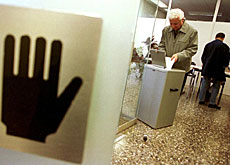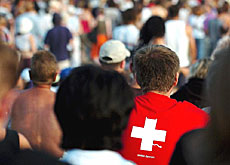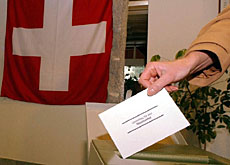Emmen puts citizenship battles to rest

Voters in Emmen have finally found a way of overcoming their reputation as naysayers to naturalisation requests.
A committee will now oversee applications in the central Swiss town, which has been making headlines since 1999 with voters’ repeated refusals of candidates from the Balkans.
More than two thirds of voters accepted the idea of a committee on Sunday.
The town is hoping that the decision will improve its reputation, which was tarnished by secret ballots that led to 97 people – most of them from the former Yugoslavia – having their applications rejected.
Citizens of Emmen, an industrial suburb of Lucerne, earned the right to vote on citizenship requests in 1999.
But in July 2003, the town was forced to review its procedure.
Switzerland’s Federal Court upheld an appeal from five applicants whose requests for Swiss citizenship had been turned down by voters.
Unfair decisions
The judges said that the Swiss, despite traditionally having the last word on all political decision, were still obliged to respect federal legislation. The court sided with critics who said secret ballots could lead to racial discrimination.
The judges’ written ruling stated that unfair ballot decisions could not be justified by claims that direct democracy overrules everything else.
The court did not rule though on the practice of deciding applications for Swiss citizenship at open community meetings. Traditionally, voters in small communities can decide on policy, including naturalisations, by a show of hands.
Local authorities in Emmen had imposed a moratorium on naturalisations while a working group tried to find a solution to the issue. The group proposed creating the commission, whose nine members will be elected by voters.
The proposal had the support of all the local political parties, including the rightwing People’s Party. The People’s Party had pushed for the introduction of the secret ballot in 1999.
Hot issue
The party is still hoping that secret ballots on citizenship will become the norm throughout all Swiss communities in the future. It has launched an initiative that would give towns and villages the right to decide naturalisation procedures.
Citizenship remains a hot-button issue in Switzerland. Last September, voters rejected parliament-backed proposals to make it easier for young foreigners to become citizens.
A majority of cantons and voters threw out the proposals, which would have granted automatic citizenship to third-generation foreigners, and eased naturalisation restrictions on the second generation.
It was the second time in a decade that voters refused to ease citizenship rules. Foreigners currently number 1.5 million – about 20 per cent of the population, and one in four of those were born in Switzerland.
The application process for Swiss citizenship is usually long and complicated.
Unless they are married to a Swiss national, most applicants must live in Switzerland for a minimum of 12 years before applying for a passport. The procedure is also very expensive – although this should change next year – without guarantees that the application will be successful.
As a result, Switzerland has one of the lowest levels of naturalisation in Europe.
swissinfo with agencies
The normal naturalisation procedure is based on approval by the federal, cantonal and local authorities, which set their own rules and fees.
Citizenship fees for will be standardised as of January 2006.
Applicants must have lived in the country for a certain number of years and prove they are integrated into Swiss society.
The first secret ballot on naturalisation requests was held in Emmen on September 12, 1999.
Until July 2003, 97 people saw their requests turned down – 85 of these came from the former Yugoslavia.
The Federal Court’s decision to declare secret ballots unfair led to changes in naturalisation procedures all over the country.

In compliance with the JTI standards
More: SWI swissinfo.ch certified by the Journalism Trust Initiative



You can find an overview of ongoing debates with our journalists here . Please join us!
If you want to start a conversation about a topic raised in this article or want to report factual errors, email us at english@swissinfo.ch.